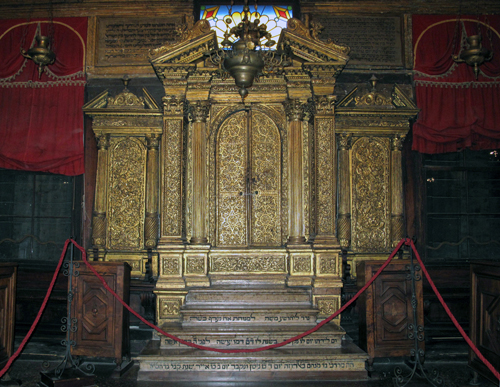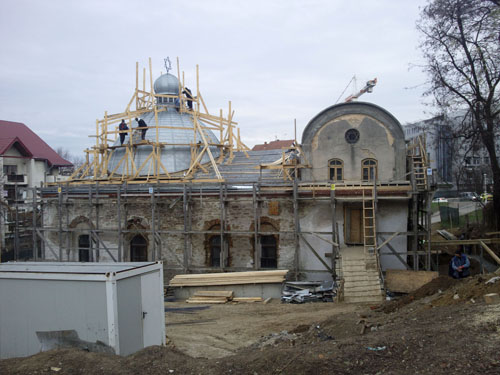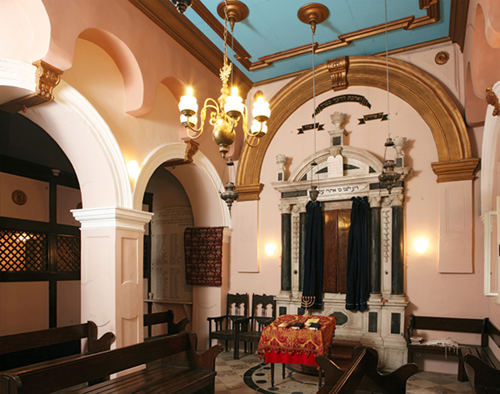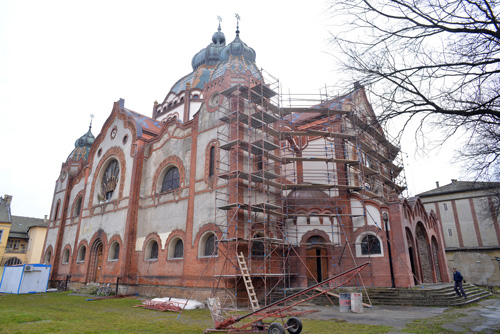NEW YORK (Press Release)– World Monuments Fund (WMF) announced on Thursday, Feb. 27, the receipt of an award of $220,000 from the David Berg Foundation of New York for five projects at Jewish heritage sites in Europe and Africa: the Schola Canton in Venice, Italy; the Great Synagogue of Iasi, Romania; Split Synagogue in Croatia; Subotica Synagogue in Serbia; and a survey and interpretation project at Jewish sites on Cape Verde. This grant is part of WMF’s Jewish Heritage Program, which since 1988 has worked to preserve more than 50 Jewish cultural sites around the world.
Lisa Ackerman, WMF Executive Vice President and Chief Operating Officer, stated: “Support from the Berg Foundation provides essential resources for an important area of heritage conservation. The sites that will benefit from this award are extraordinary places both for their architectural beauty and their significance as an educational resource for telling the history of Jewish culture around the world.”

Schola Canton was constructed in 1532, shortly after the enforced segregation of Jews in the Venetian Ghetto Nuovo, widely considered the first Jewish ghetto in Europe. This sixteenth-century structure has welcomed millions of visitors and is now in need of repairs to ensure its continuing role in Jewish heritage tourism and education. WMF’s project at this site will include cleaning, repairing, consolidating, and re-gilding Schola Canton’s intricately carved wooden sanctuary. Work is expected to begin in March 2014.
Great Synagogue of Iasi, Romania

The conservation needs of the Great Synagogue of Iasi, the oldest synagogue in Romania, came to WMF’s attention through its nomination to the 2014 World Monuments Watch. Conservation work being undertaken on the building by Romania’s Ministry of Culture and Patrimony was halted in 2008, leaving the structure in a precarious state. Since the inclusion of this site on the Watch, work has been re-started by the ministry and the government has committed nearly $200,000 to the project. Over the course of the next two years, WMF will advocate for the protection of this site and assist with conservation needs.
Split Synagogue, Croatia

Split Synagogue was constructed in the early sixteenth century and is one of the oldest surviving Sephardic synagogues in Europe. WMF’s involvement in this project will be to repair damage caused by water infiltration and to stop moisture from entering the sanctuary in order to prevent further deterioration. Work is expected to begin in March 2014.
Subotica Synagogue

After years of limited access, Subotica Synagogue in Serbia is now open to the public following more than a decade of preservation work supported by WMF, and has become a tourism destination. In recent years, a modest exhibit on the history of the synagogue was installed in the sanctuary to help visitors learn about the building and its importance in Jewish history. To aid the community and visitors in learning more about the history of Subotica’s synagogue and the local Jewish population, WMF will expand this exhibition and create a companion video and web presentation. This will enhance the interpretation of the synagogue and be a contributing educational tool for the residents of Subotica.
Cape Verde
Cape Verde had a prominent community of Jews in the nineteenth century that came to this group of islands off the coast of Senegal from Morocco and Gibraltar in search of economic opportunity. The majority of these Jews were men, many of whom played important roles in Cape Verde’s economy and administration, and ended up marrying local Catholic women and assimilating into Cape Verdean culture. WMF will partner with the Cape Verde Jewish Heritage Project to help research, interpret, and promote this unique Jewish history.
*
Launched in 1988, WMF’s Jewish Heritage Program leads international efforts to preserve Jewish cultural heritage sites around the world, particularly in places where local resources and fundraising capacities are limited.
Over the course of nearly 25 years, the Jewish Heritage Program has supported conservation work at more than 50 sites in over 25 countries, including France, Greece, Hungary, India, Lithuania, Morocco, and Poland, ranging in date from the fifteenth to the early twentieth century.
World Monuments Fund is a leading independent organization devoted to saving the world’s most treasured places. For nearly 50 years, working in 100 countries, its highly skilled experts have applied proven and effective techniques to preserve important architectural and cultural heritage sites around the globe. Through partnerships with local communities, funders, and governments, WMF inspires an enduring commitment to stewardship for future generations. Headquartered in New York, WMF has offices and affiliates worldwide.
*
Preceding provided by World Monuments Fund
*
San Diego Jewish World seeks sponsorships to be placed, as this notice is, just below articles that appear on our site. This is an ideal opportunity for your corporate message or to personally remember a loved one’s contributions to our community. To inquire, call editor Donald H. Harrison at (619) 265-0808 or contact him via donald.harrison@sdjewishworld.com